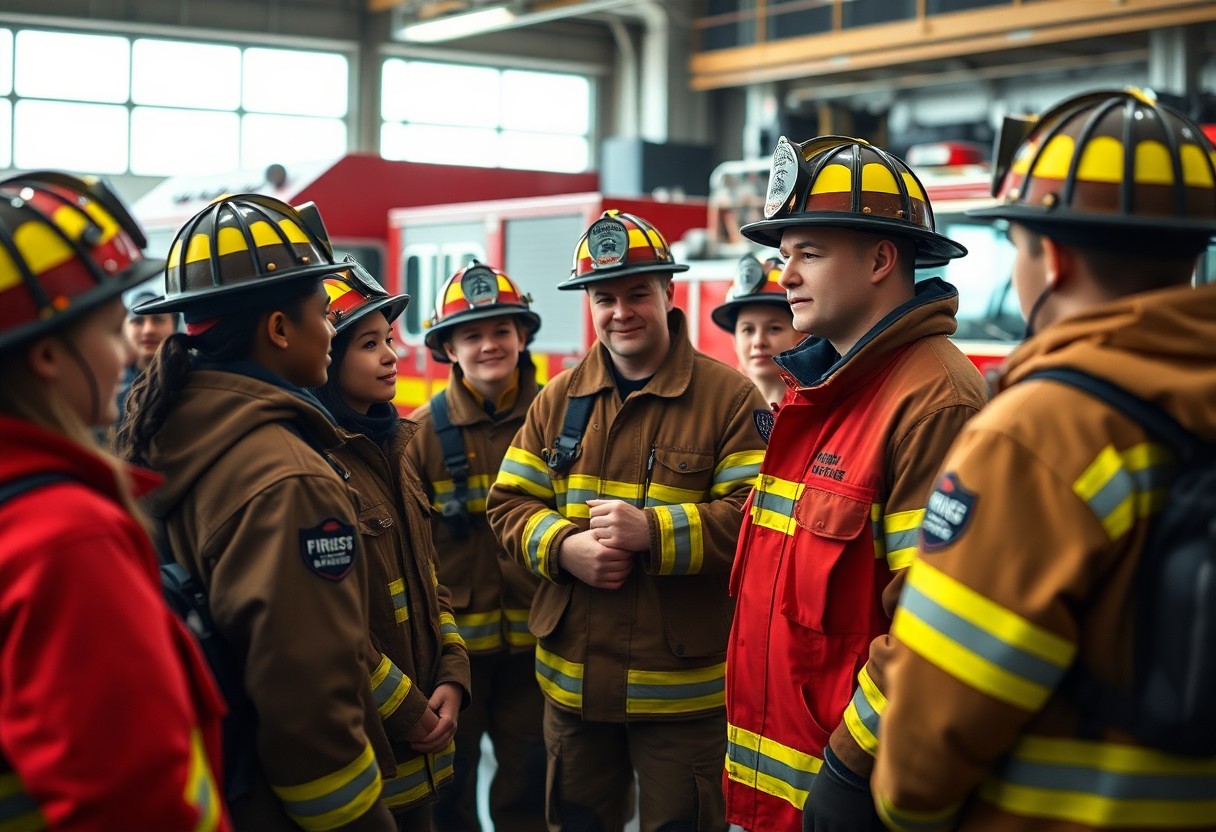This guide will help you nurture and develop leadership qualities in young volunteers in your fire department. By implementing effective mentoring strategies, offering hands-on experiences, and encouraging teamwork, you can empower the next generation of leaders. It’s important to provide opportunities for your volunteers to take on responsibilities, make decisions, and learn from their experiences. With the right approach, you can cultivate a strong, capable team that is ready to face any challenges that come their way.
Understanding Leadership in Volunteer Fire Departments
Before you explore into fostering leadership skills, it’s crucial to understand the unique environment of volunteer fire departments. These organizations rely heavily on dedicated individuals who not only fight fires but also serve their communities. Leadership here is not just about authority; it’s about inspiring teamwork, ensuring safety, and developing a cohesive unit that operates effectively under pressure.
Definition of Leadership Skills
With effective leadership skills, you cultivate qualities such as communication, decision-making, and problem-solving. These attributes enable you to guide your team through challenging situations, ensuring that everyone remains aligned with the department’s mission and values. Strong leaders foster not only operational efficiency but also trust and camaraderie among volunteers.
Importance of Leadership in Firefighting
With solid leadership, your volunteer fire department becomes a unified team capable of responding swiftly and effectively to emergencies. You prepare your members to act decisively while maintaining a focus on safety and accountability, ultimately enhancing the overall effectiveness of your firefighting efforts.
Skills in leadership are paramount, as they allow you to manage high-stress situations where every second counts. Strong leaders build a culture of trust and communication, ensuring that team members feel confident to speak up and share their observations during operations. This vigilance can often be the difference between life and death in fire scenarios. Furthermore, when you exemplify initiative and responsibility, you empower your team to develop similar qualities, fostering a sense of pride and commitment in their volunteer roles.
Identifying Key Factors for Development
It is crucial to identify the key factors that influence the development of leadership skills in young volunteers. Consider the following elements:
- Mentorship
- Training Opportunities
- Recognition of Efforts
- Team Dynamics
Each of these aspects plays a vital role in fostering a conducive atmosphere for growth. Perceiving these factors allows you to tailor your approach in nurturing leadership traits effectively.
Supportive Environment
Some environments can either hinder or promote the growth of leadership skills. By fostering a supportive atmosphere, you encourage young volunteers to take initiative and express their ideas without fear of criticism. Encouragement, constructive feedback, and positive reinforcement contribute significantly to developing their confidence and decision-making abilities.
Access to Resources and Training
Factors such as access to training programs and necessary resources greatly impact the development of leadership skills in young volunteers. Without these, the potential for growth remains limited.
Environment plays a significant role in providing access to training and resources necessary for leadership development. Establishing a training program that focuses on teamwork, communication, and problem-solving skills equips young volunteers with the tools they need. Providing materials and opportunities for hands-on experience encourages them to face real-life challenges. In this way, a well-structured environment fosters resilience and adaptability—traits crucial for effective leadership in the field.
How to Create Leadership Opportunities
You can cultivate leadership skills in young volunteers by establishing clear pathways for growth within your fire department. Involve them in various activities where they can take charge, whether it’s organizing community safety events, leading training sessions, or participating in outreach programs. Empower them to voice their ideas and concerns, ensuring they feel valued and engaged in the decision-making processes. This not only enhances their leadership skills but also builds a stronger team dynamic and commitment to the department’s objectives.
Mentorship Programs
There’s significant value in implementing mentorship programs where experienced firefighters can guide young volunteers. Pair them with seasoned mentors who can provide insights, share experiences, and foster personal growth. This one-on-one relationship cultivates a supportive learning environment that encourages young volunteers to take initiative and develop their leadership style.
Leadership Roles in Firefighting Activities
You can enhance leadership development by assigning specific leadership roles during firefighting activities. Allow young volunteers to lead training drills, coordinate community outreach efforts, or manage teamwork scenarios during live responses. This hands-on experience is instrumental in fostering their ability to make decisions under pressure while developing effective communication and teamwork skills.
Programs that assign leadership roles in firefighting activities help young volunteers gain experience and confidence. These roles can vary from organizing training sessions to serving as team leaders during mock drills, which not only builds their skill set but also reinforces accountability. By actively participating in high-stakes scenarios, they develop not only their fire service skills but also critical decision-making abilities. Additionally, regularly rotating these roles prevents complacency and continuously challenges them to grow, fostering resilience and adaptability that are vital for any emergency responder.
Tips for Engaging Young Volunteers
Keep young volunteers actively involved by implementing a variety of engagement strategies. Focus on creating an inviting environment where they feel valued and can learn. Here are some tips:
- Encourage participation in team-building activities.
- Provide leadership roles that match their interests.
- Organize workshops for skill development.
- Invite them to contribute ideas for departmental improvements.
After incorporating these strategies, you will foster a sense of ownership and commitment among young volunteers.
Encouragement and Recognition
Clearly acknowledging the efforts of young volunteers is key to their growth. Regularly provide positive feedback and recognition for their contributions. This not only boosts their confidence but also motivates them to take on more responsibilities.
Providing Constructive Feedback
Recognition of efforts should be accompanied by a solid understanding of improvement areas. Providing constructive feedback ensures young volunteers know how to enhance their skills. Make it a point to share specific observations about their performance while highlighting positive attributes. This approach allows you to gently guide them toward better practices, fostering their development as effective leaders.
This feedback process should be balanced. Always start by acknowledging what they did well to create a supportive environment. Then, pinpoint the areas for improvement using specific examples, which can enhance their understanding. Focus on offering actionable suggestions that can lead to better outcomes in future scenarios. By fostering this atmosphere, you promote growth while helping them build crucial leadership skills critical in their roles.
Training Methods to Develop Skills
Now, focusing on effective training methods is key to nurturing leadership skills in your young volunteers. Incorporating diverse techniques such as workshops, simulations, and collaborative learning can enhance their experience and ensure they develop the necessary qualities needed for leadership roles within the fire department. By engaging them in hands-on practices, you’ll prepare them for real-life situations and foster a sense of responsibility and teamwork.
Workshops and Simulations
To engage young volunteers effectively, consider organizing interactive workshops and simulations that focus on critical thinking and decision-making under pressure. These sessions can replicate real-life scenarios they might face during emergencies, providing them with invaluable opportunities to lead and learn from mistakes.
Collaborative Learning Experiences
Little do many know that collaborative learning experiences can significantly enhance the leadership skills of young volunteers. By allowing them to work together on projects or during drills, they can learn to communicate effectively, build trust, and understand different perspectives.
For instance, when young volunteers work in teams during training exercises, they face realistic challenges that require collective problem-solving. They might be tasked with coordinating a mock emergency response where each volunteer plays a critical role. This setting not only promotes effective communication but also teaches the importance of trust and responsibility. As they navigate these scenarios, they learn how to support one another in high-pressure situations, which is vital for their personal growth and can translate to their roles in actual emergencies.
Measuring Success in Leadership Development
Despite the challenges that may arise in fostering leadership skills within volunteer fire departments, measuring success is vital. You can gauge progress by evaluating individual growth, team dynamics, and overall community impact. Implementing both qualitative and quantitative metrics will help you assess how well young volunteers are developing their leadership capabilities and contributing to the organization.
Setting Clear Expectations
Even when young volunteers are eager to learn, it is vital to establish clear expectations from the outset. By outlining specific responsibilities and goals, you empower them to take ownership of their roles. This clarity not only motivates them but also helps them understand the importance of teamwork and accountability in a fire department setting.
Regular Evaluation and Feedback
If you want to ensure the ongoing development of leadership skills, regular evaluation and feedback are necessary. This process allows you to assess individual progress while promoting continuous improvement. Constructive feedback encourages young volunteers to reflect on their performance and adapt, laying the foundation for effective leadership.
With consistent evaluation and constructive feedback, you provide young volunteers the opportunity to identify their strengths and areas for growth. This dialogue fosters an environment of open communication and aligns their personal goals with the department’s objectives. Providing timely feedback and creating regular assessment intervals helps you ensure that they are on track in their leadership journey while also addressing any challenges they face promptly. It is through this support and engagement that you can truly cultivate their leadership potential.
Final Words
So, by actively engaging young volunteers in hands-on training, mentorship, and collaborative projects, you can cultivate their leadership skills within your volunteer fire department. Encourage them to take initiative, provide constructive feedback, and create opportunities for them to lead small teams. Additionally, fostering a culture of open communication and support will empower your youth to grow into confident leaders. Investing in their development benefits not only the individuals but also enhances the overall effectiveness of your department!
Q: How can volunteer fire departments assess the leadership potential of young volunteers?
A: Volunteer fire departments can assess the leadership potential of young volunteers through a combination of observations, evaluations, and structured assessments. Regular performance reviews can help identify willingness to take initiative, communication skills, and problem-solving abilities. Additionally, mentoring programs can encourage more experienced members to provide feedback on the young volunteers’ leadership behavior during training exercises and real-life emergency situations. Engaging young volunteers in team projects and assessing their roles can also highlight their leadership capabilities.
Q: What training programs can be implemented to enhance leadership skills among young volunteers?
A: To enhance leadership skills among young volunteers, fire departments can develop tailored training programs that include workshops, simulations, and leadership courses. Programs focusing on communication, teamwork, conflict resolution, and decision-making will foster crucial skills. Using real-life scenarios in simulations can provide practical experience and empower young volunteers to make decisions under pressure. Moreover, inviting guest speakers who have experience in leadership roles can provide unique insights and inspire young volunteers.
Q: How important is mentorship in developing leadership skills for young volunteers in fire departments?
A: Mentorship is highly beneficial in developing leadership skills for young volunteers in fire departments. By connecting younger members with seasoned firefighters, they gain valuable insights, guidance, and encouragement. Mentorship fosters a supportive environment where young volunteers can discuss challenges, seek advice, and observe effective leadership behaviors. This relationship not only builds confidence and skills but also creates a sense of belonging and commitment to the fire department, encouraging them to take on more leadership roles in the future.



